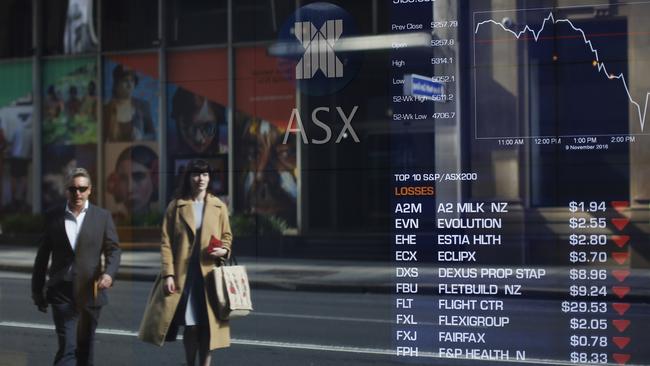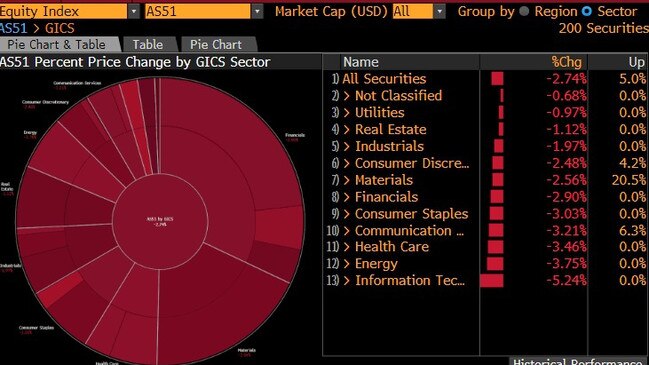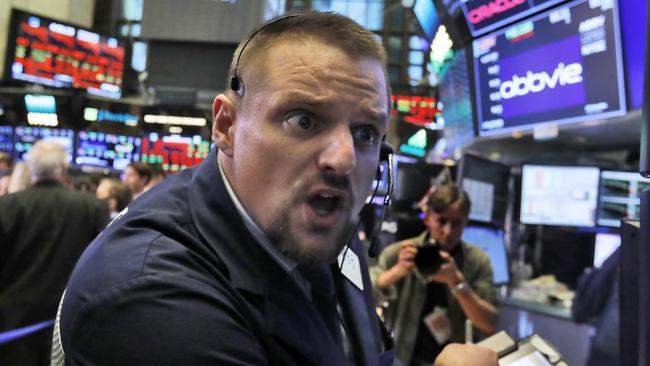Australian stocks smashed in $50bn wipeout as Asia joins sell-off
Local stocks have slid to a five-month low with the week’s losses nearing $100bn as Asian markets joined the sell-off.

About $50 billion was wiped off the local sharemarket today as it plunged to its lowest close in five months in the biggest one-day drop since February.
At the close of trade, the benchmark S&P/ASX200 had tumbled 166.006 points, or 2.74 per cent, to 5883.801 points. The broader All Ordinaries index had dropped 170.385 points, or 2.76 per cent, to 5993.4 points.
Around $90bn has been wiped off the market so far this week, with the main index down 4.9 per cent.
The sharp losses followed a heavy sell-off on Wall Street overnight amid worries about hiking US interest rates and the impact of trade disputes.
“It was an unsettling decline and it comes on the heels of steep declines in the US overnight,” said CommSec market analyst Tom Piotrowski.
He said there was no one single catalyst for the plunge in US equities overnight, but put heightened volatility down to unwinding interest rates, simmering trade tensions and a generally higher oil price.
“US futures continued to sell-off in after-hours trade so that’s part of the reason why our market fell so sharply,” Mr Piotrowski said.
“In early trade it was down by 2 per cent and it looked like it was going to find its footing.
“But then around lunchtime, US futures in after-hours trade sold off aggressively, adding to the declines we’d already seen during the session and that further unnerved regional investors.”
At 4.15pm (AEDT), markets around the region had lowered sharply.
The Shanghai Composite was trading 4.4 per cent lower, Japan’s Nikkei had lost 4.06 per cent, the Hang Seng was down 3.88 per cent and Korea was 3.79 per cent lower.
The losses on around the region came ahead of key US inflation data, which is due to be released on Thursday night.
In financials, ANZ lost 3.24 per cent to $26.01 while Commonwealth Bank stepped back 2.86 per cent to $67.00. Westpac turned down 2.56 per cent to $26.29 while NAB backtracked 2.55 per cent lower to $26.00.
BHP dropped 3.8 per cent to $33.40 while Rio Tinto weakened 3.23 per cent to $76.61. Fortescue fell 2.45 per cent to $3.76.
It came despite a 1.6 per cent rise in the price of iron ore on Wednesday night.
Telstra plunged 3.12 per cent to $3.11, after chairman John Mullen apologised in a letter to shareholders for not meeting their expectations on senior executive pay, ahead of the company’s annual general meeting.
Tech was the worst performing sector following a selloff in FANG stocks on Wall Street overnight.
Afterpay Touch plunged 11.05 per cent to $13.76 while Wisetech tumbled 10.46 per cent to $16.43.
Xero dropped 6.26 per cent to $42.52 after hitting a two-month low of $42.48 during the session.
The energy sector backtracked overnight after the oil price fell on demand fears.
Oil Search shed 4.05 per cent to $8.53 while Origin Energy slid 2.71 per cent to $8.25. Santos gave back 5.56 per cent to $6.97 while Woodside Petroleum was cut by 3.63 per cent to $36.65.

Gold miners were among the best performers as investors looked to safe haven-linked equities.
St Barbara gained 6.27 per cent to $3.73 while Resolute Mining rose 2.51 per cent to $1.02.
Evolution Mining jumped 6.27 per cent to $2.88 while Regis Resources stepped up 2.94 per cent to $3.85. Northern Star improved 2.04 per cent to $8.50.
The Australian dollar was slightly higher at US70.70 cents in late trade.

In the US, the Dow shed about 830 points, in the biggest fall since February, to close the day down 3.2 per cent at 25,498.74.
The broadbased S&P 500 slumped 3.3 per cent to end at 2,785.68, while the tech-rich Nasdaq Composite Index plummeted 4.1 per cent to finish the session at 7,422.05, its worst fall in percentage terms since the surprise Brexit vote in June 2016.
Mr Trump has repeatedly touted Wall Street records as proof of the success of his economic program, including his confrontational trade strategy.
But he downplayed the first major drop in months, saying, “it’s a correction that we’ve been waiting for a long time”.
Mr Trump has frequently criticised the US central bank for gradually raising interest rates, and today reiterated his position: “I really disagree with what the Fed is doing.”
In fact it is his policies that are behind the changes: tax cuts and spending policies are expected to juice the economy, adding to the Fed’s justification to raise interest rates, while trade conflicts raise costs for companies, which could hit the bottom line in quarterly earnings — something analysts said helped prompt the overnight sell-off.
The rout in US shares followed substantial losses on European bourses, due in part to tensions between Brussels and Rome over Italian budget plans that have revived fears about the eurozone.
“There are a number of worries for investors right now, from the pace of rising bond yields and the impact on investor sentiment, to Italy’s populist coalition playing a game of chicken with the European Commission, stalling Brexit negotiations and theongoing trade conflict between the US and China,” said Craig Erlam, senior market analyst at Oanda trading group.
Many of the biggest US names fell hard, with Apple, Boeing and Facebook all slumping more than four per cent and Amazon, Nikeand Microsoft dumping more than five per cent.
“The selling is not panicking but it’s persistent,” Briefing.com analyst Patrick O’Hare said of the proceedings. “It’s all about investors rethinking their exposure to stocks.”
Mr O’Hare attributed the losses to worries about higher interest rates but also cited a “broadscale deterioration in sentiment” as investors realised that the pullback on Wall Street failed to prompt bargain hunting to stabilise prices, as has been the norm in recent years.
US stocks have been under pressure since the yield on 10-year US Treasury bonds jumped above three per cent last week, a suddenmove that raised fears of an overheating economy, speeding inflation and more aggressive Federal Reserve interest rate increases.
Last week’s jump in yields followed strong US data but many analysts have been anticipating dynamics in the bond market to change due to expectations that central banks in Europe and Japan will soon phase out bond-buying programs.
“It’s shifting the tectonic plates,” said Jack Ablin, chief investment officer at Cresset Wealth Advisors.
He said the rising appeal of bond investments would be a challenge for stocks in the foreseeable future as capital moves out of riskier equities.
And while stocks could get a boost from strong corporate earnings, there are concerns the US trade conflicts will start toundermine profits.
With Wires






